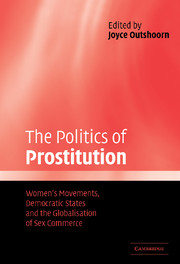 The Politics of Prostitution
The Politics of Prostitution Book contents
- Frontmatter
- Contents
- List of figures
- List of tables
- Notes on contributors
- Preface
- 1 Introduction: prostitution, women's movements and democratic politics
- 2 The women's movement and prostitution politics in Australia
- 3 Taxes, rights and regimentation: discourses on prostitution in Austria
- 4 Prostitution policies in Britain, 1982–2002
- 5 Prostitution as public nuisance: prostitution policy in Canada
- 6 Towards a new prohibitionism? State feminism, women's movements and prostitution policies in Finland
- 7 Prostitute movements face elite apathy and gender-biased universalism in France
- 8 The politics of prostitution and trafficking of women in Israel
- 9 Italy: the never-ending debate
- 10 Voluntary and forced prostitution: the ‘realistic approach’ of the Netherlands
- 11 State feminism and central state debates on prostitution in post-authoritarian Spain
- 12 Criminalising the john – a Swedish gender model?
- 13 The invisible issue: prostitution and trafficking of women and girls in the United States
- 14 Comparative prostitution politics and the case for state feminism
- Appendix 1 Independent variable indicators
- Appendix 2 Worksheets
- References
- Index
14 - Comparative prostitution politics and the case for state feminism
Published online by Cambridge University Press: 22 September 2009
- Frontmatter
- Contents
- List of figures
- List of tables
- Notes on contributors
- Preface
- 1 Introduction: prostitution, women's movements and democratic politics
- 2 The women's movement and prostitution politics in Australia
- 3 Taxes, rights and regimentation: discourses on prostitution in Austria
- 4 Prostitution policies in Britain, 1982–2002
- 5 Prostitution as public nuisance: prostitution policy in Canada
- 6 Towards a new prohibitionism? State feminism, women's movements and prostitution policies in Finland
- 7 Prostitute movements face elite apathy and gender-biased universalism in France
- 8 The politics of prostitution and trafficking of women in Israel
- 9 Italy: the never-ending debate
- 10 Voluntary and forced prostitution: the ‘realistic approach’ of the Netherlands
- 11 State feminism and central state debates on prostitution in post-authoritarian Spain
- 12 Criminalising the john – a Swedish gender model?
- 13 The invisible issue: prostitution and trafficking of women and girls in the United States
- 14 Comparative prostitution politics and the case for state feminism
- Appendix 1 Independent variable indicators
- Appendix 2 Worksheets
- References
- Index
Summary
Introduction
After presenting the results of thirty-six debates on prostitution from twelve countries, this chapter returns to the original question that motivated the RNGS research project: do women's policy agencies matter? If they do, the results make the case for state feminism: governments can be effective in promoting an agenda in favour of improving women's status. The analyses also enable us to answer the question as to the conditions in which effectiveness occurs.
In the preceding chapters all authors have provided an in-depth analysis of the politics of prostitution in their countries. Here their findings have been adapted for the purpose of the analysis of this chapter. Such an adaptation invariably entails a loss of detail and runs the risk of eliminating important cultural aspects of the politics in a country. To minimise this risk, all authors, being the most familiar with the national context of ‘their’ debates, have provided the classification of their findings within the conceptual framework of the RNGS project. The resulting measurements will be compared to examine the hypotheses presented in chapter 1 aimed at assessing the effectiveness of the women's policy agencies. The impact of the women's movement actors will then be determined across debates and countries, after which the role of the women's policy agencies in the debates making for movement success is assessed. Movement success will be related to the characteristics of the women's movement; then the characteristics of the agencies are analysed to determine which ones are associated with impact.
- Type
- Chapter
- Information
- The Politics of ProstitutionWomen's Movements, Democratic States and the Globalisation of Sex Commerce, pp. 265 - 292Publisher: Cambridge University PressPrint publication year: 2004
- 3
- Cited by


